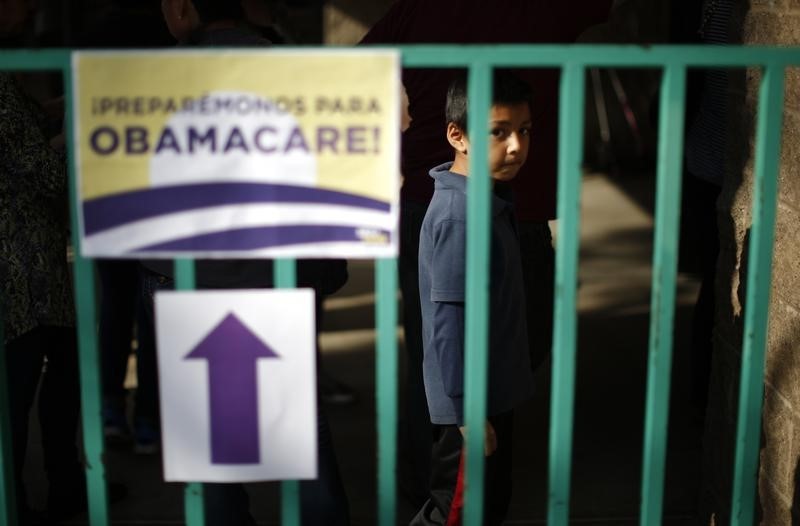By John Whitesides
WASHINGTON (Reuters) - Obamacare could put Republicans in a bind in the run-up to the 2016 U.S. presidential election if the U.S. Supreme Court in the next week upends part of the law designed to make healthcare accessible to all Americans, leaving millions to fend for themselves for health insurance.
The court is due to decide by the end of June whether to jettison tax subsidies in 34 states that help low- and moderate-income people buy medical coverage. A political flashpoint since it was signed into law by President Barack Obama in 2010, the Affordable Care Act (Obamacare) makes federal subsidies available to people who cannot afford to pay for health insurance.
The challenge, mounted by conservative critics, focuses on four words in the law: "established by the state." The court is being asked to decide if that means only people using state-run exchanges, as opposed to one administered by the federal government, are eligible for federal subsidies to pay for insurance.
If the court rules against that section of the law, it could leave up to 6.4 million people without health coverage, increasing pressure on Republicans to produce a viable alternative or take the blame for the resulting chaos.
Presidential battleground states such as Florida, Ohio, Wisconsin and North Carolina will be among the states with residents who lose their subsidies, heightening the political impact.
NOW YOU HAVE IT, NOW YOU DON'T
A number of Republican proposals would unwind Obamacare altogether. Republicans have criticized it as a bloated, big-government solution and objected to its mandate requiring insurance coverage. Still, more than 16 million Americans have acquired health coverage under the law.
Republicans who have long fought the law could begin to look hard-hearted and ineffectual if they ignore what is certain to be an explosion of stories about Americans losing health insurance.
"Republicans will have to move quickly because they can't look like they are sitting around making political calculations while people are losing their insurance," said Robert Blendon, a health policy and politics analyst at Harvard University.
"They won't be able to say 'call us in 2017.' It's going to be a very explosive and pressing issue," Blendon said.
The issue could be made even more urgent by the timing of the pending decision. It is seven months before the first nominating contests for the November 2016 election, which will decide the next president and the balance of power in the U.S. Congress.
If the court strikes down the subsidies, Democratic contenders such as Hillary Clinton will be able to point the finger of blame at Republicans, while Republican hopefuls will have to balance the search for a solution with concerns over conservative primary voters who will accept nothing short of the law's repeal.
And by virtue of their roles in Congress, Republican presidential contenders Ted Cruz of Texas, Marco Rubio of Florida, Rand Paul of Kentucky and Lindsey Graham of South Carolina, all U.S. senators, would be smack in the middle of the political battle.
VIRULENT OPPOSITION COULD FOIL FIX
In theory, Congress could restore the subsidies by amending the four words in the law that are at issue. But the partisan gridlock in Congress over a Democratic-backed law passed over Republican opposition makes that outcome unlikely.
Some Republican lawmakers in Congress met this month to discuss possible solutions, including a short-term restoration of the subsidies in exchange for concessions such as elimination of the mandate that all individuals have insurance or face a fine. Republicans could craft a law along those lines, forcing Obama to decide whether to veto such a bill and risk becoming a political heavy.
For Republicans, that could carry the added bonus of forcing Clinton to take a stand for or against the law and by extension Obama.
The Republican response could be complicated by conservatives like Cruz, who pushed a fight to repeal Obamacare in 2013 that led to a 16-day shutdown of the federal government. He has said he will lead the opposition to any plan that keeps even a portion of Obamacare alive.
"In a perfect world, we would take that opportunity to repeal Obamacare. At a minimum, we should allow states to opt out," Cruz recently told political news website Politico.
AMERICANS GENERALLY SATISFIED - POLL
Republicans have taken dozens of votes in Congress to repeal or alter the law without success. Polls have mostly shown, with little variation, that only a slim majority of Americans disapprove of Obamacare.
A Reuters/Ipsos opinion poll published in May found that Americans with health insurance under Obamacare, including Republicans, are generally satisfied with it.

Obamacare was opposed by 53 percent of almost 21,000 Americans surveyed, and favored by 47 percent. But 60 percent of the roughly 1,800 survey respondents who have coverage through Obamacare favored the law. Within that group, almost two-thirds were satisfied with the healthcare they were getting, including 73 percent of Democrats and 53 percent of Republicans.